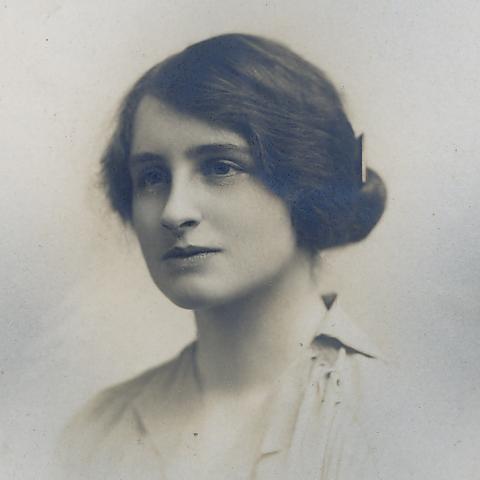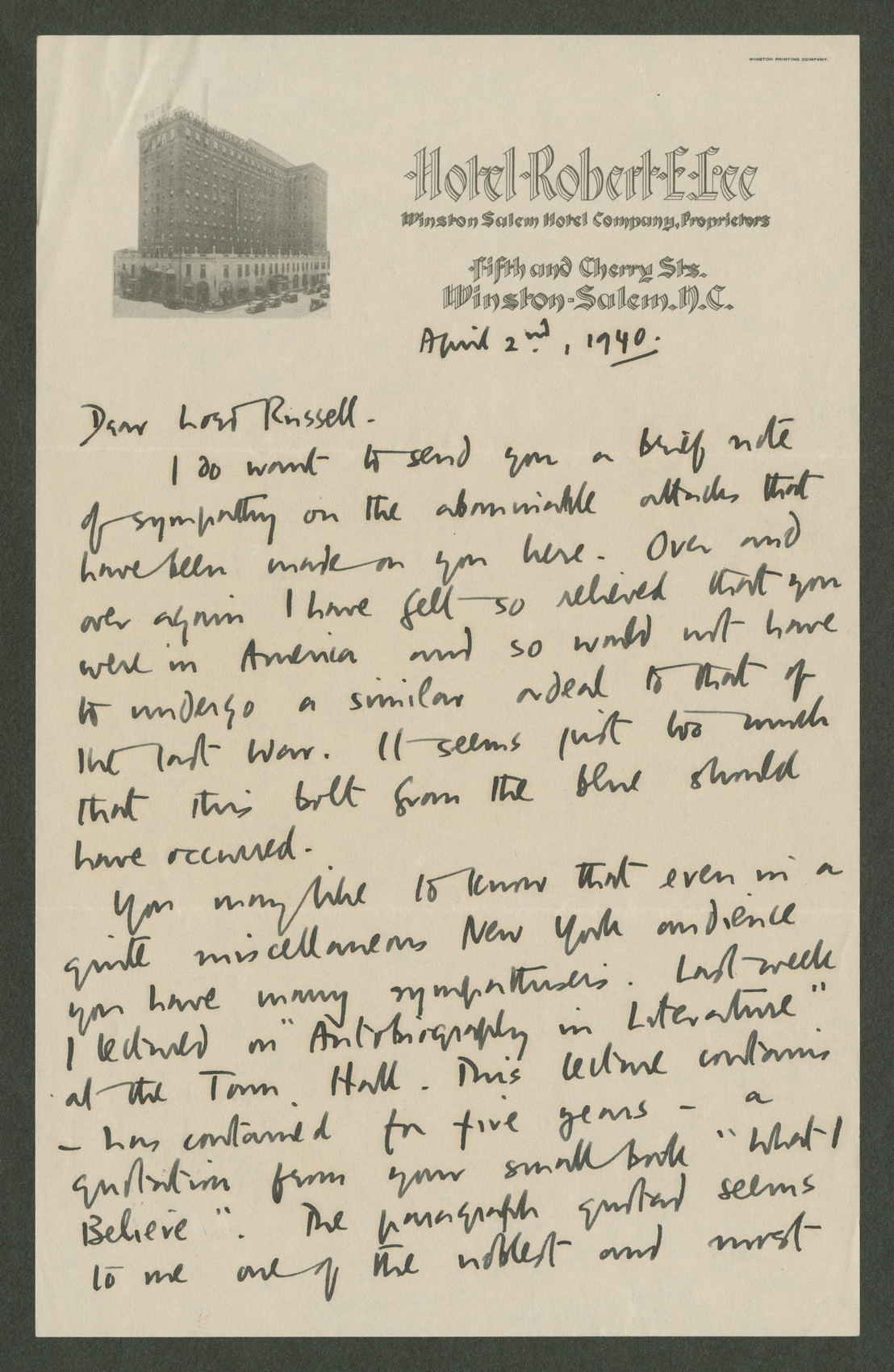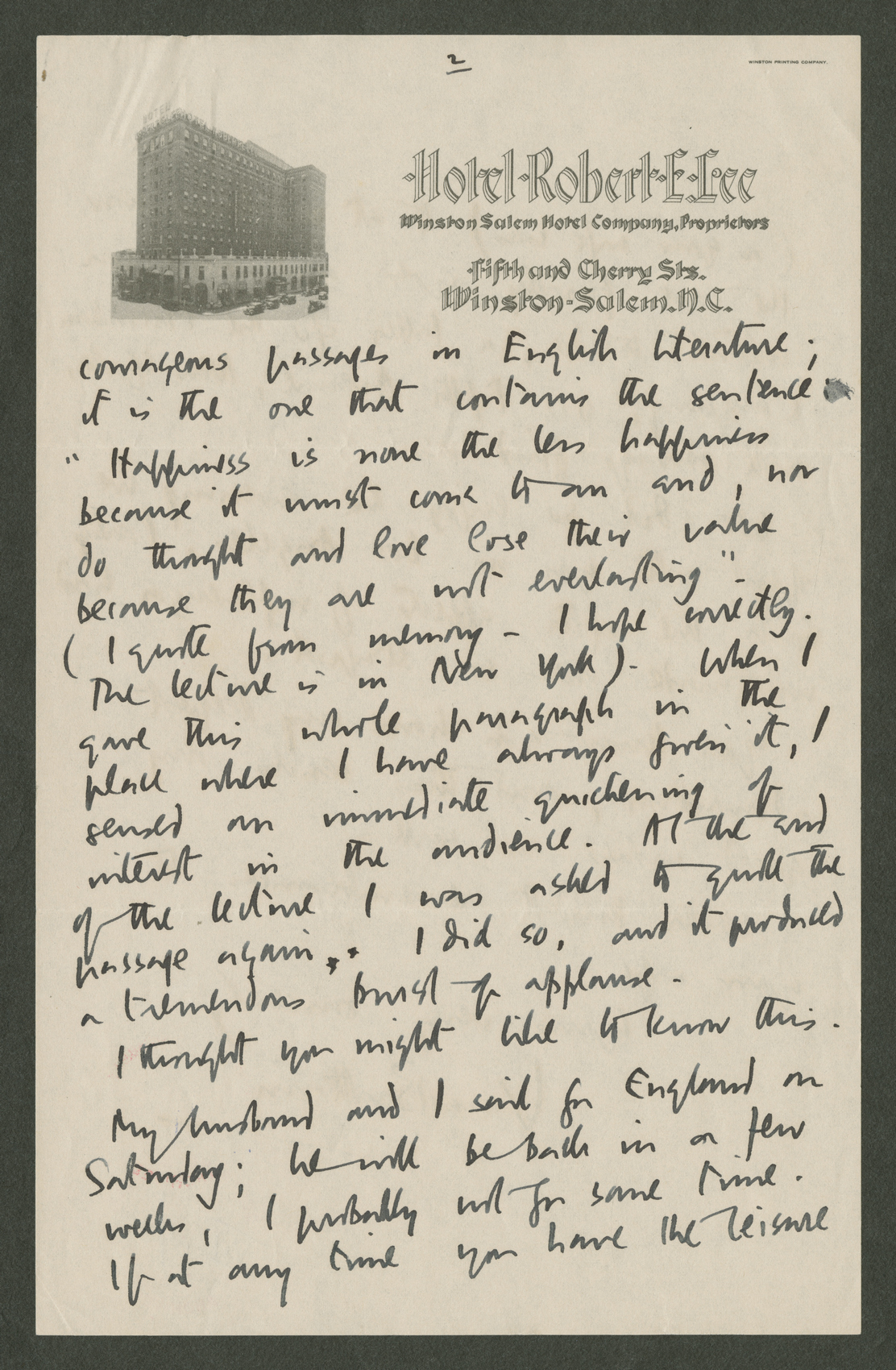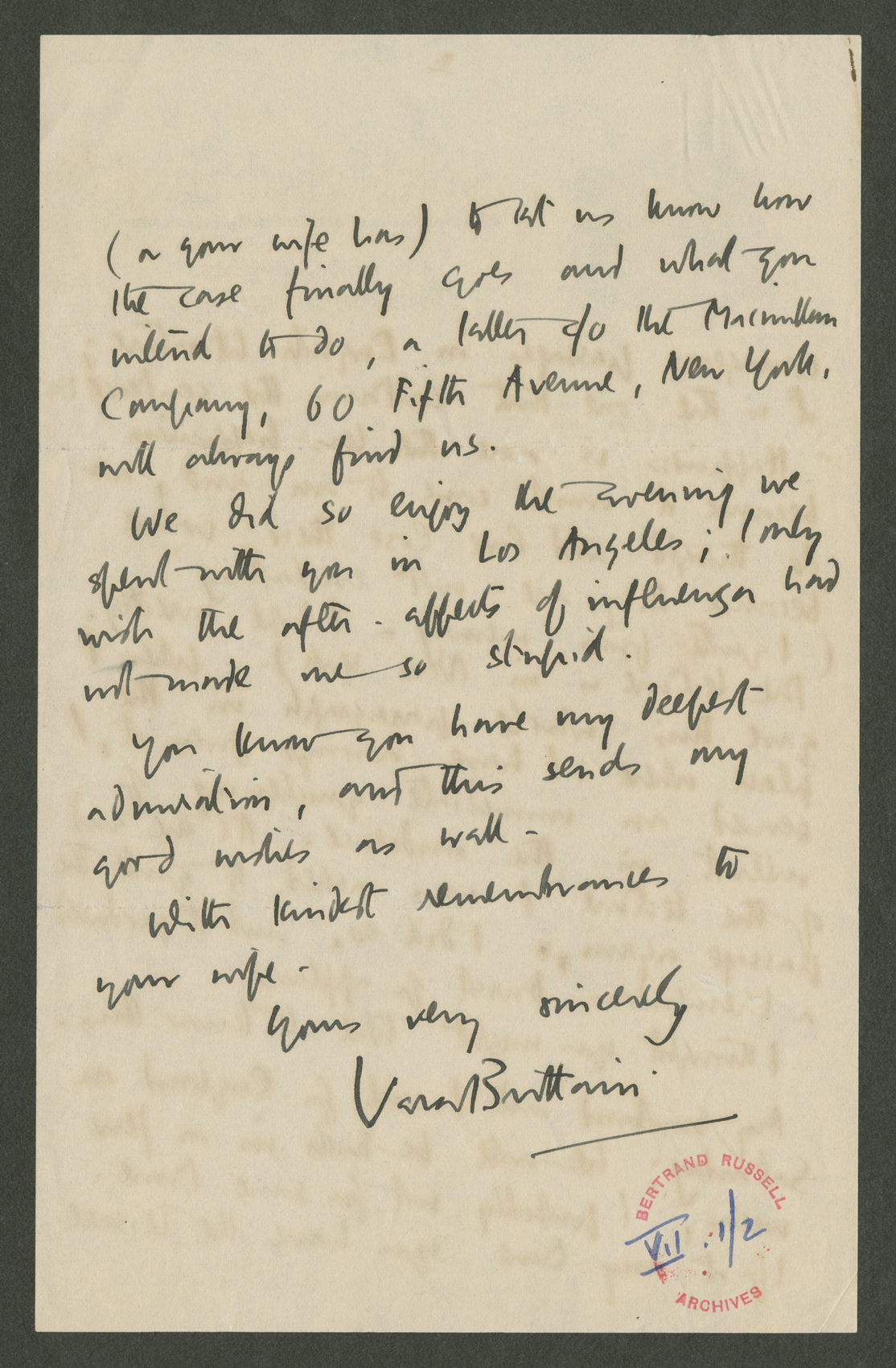“a brief note of sympathy on the abominable attacks that have been made on you here”
Vera Brittain to Bertrand Russell
April 2, 1940

In the spring of 1940, Russell was the subject of a very public controversy in the United States. The previous year, he had begun what was supposed to have been a three-year appointment as professor of philosophy at the University of California. Almost from the beginning, however, he did not get along with the University president. Russell was pleased to tender his resignation in February 1940 when he received what he thought was a firm offer from the College of the City of New York to begin teaching there the following year. However, the CCNY offer still needed to go through an approval process. The approval never happened. Instead, a religious lobby, led by Episcopal bishop William T. Manning with strong Catholic support, spoke out against Russell, accusing him of immorality for works such as Marriage and Morals which had been published a decade earlier. Soon a legal action was taken to prevent the appointment, and despite support from academics such as fellow philosophers John Dewey and Alfred North Whitehead (who was now at Harvard), the legal action was successful. The words spoken against Russell at this time were often extreme and absurd. In summing up the case against him, Russell noted in his Autobiography: “The lawyer for the prosecution pronounced my works ‘lecherous, libidinous, lustful, venerous, erotomaniac, aphrodisiac, irreverent, narrow-minded, untruthful, and bereft of moral fiber’.”
In the midst of all the chaos, Russell received this letter of support from Vera Brittain, one of England’s leading pacifists, who was just ending a speaking tour of the United States. She and Russell were already acquainted, and Brittain and her husband, George Catlin, had had dinner with Russell and his wife, Peter, when Brittain was on the California leg of her speaking tour in February. Brittain’s path to pacifism had begun during the First World War and was recounted in her memoir Testament of Youth which had been published to great acclaim in 1933, the same year that Hitler became Chancellor in Germany. Three years later, she was trying to decide whether to join the Peace Pledge Union, a pacifist group that, as its name suggests, required its members to take a pledge for peace—among the first to do so was Bertrand Russell. Brittain’s decision to join came only after she read Russell’s Which Way To Peace? which convinced her that pacifism was the best option in the face of war with Hitler. Russell, like many other early PPU members, would soon change his mind and come to believe that Hitler needed to be resisted, but Brittain would stay the course and suffered great public condemnation for it.
Brittain’s letter, however, does not mention war or peace. Instead, she offers Russell her “sympathy on the abominable attacks that have been made on you here” and assures him that “even in a quite miscellaneous New York audience you have many sympathisers.” She then goes on to tell Russell about a recent New York lecture she gave in which she quoted from his book, What I Believe, much to the audience’s appreciation. It is obvious from the letter that Brittain had great respect and admiration for Russell.
Russell did not reply directly to this letter—at the time, Peter was handling much of his correspondence. She wrote a letter of thanks to George Catlin who had made inquiries on Russell’s behalf for employment at Cornell University, where Catlin had earlier taught political science, and in her letter she asked Catlin to give Russell’s “warm regards … to your wife and thank her for her very kind letter.” Nothing came of Cornell, but Catlin did not give up. Upon returning to England, he was one of several academics who, in the later years of the Second World War, began the movement to have Russell re-instated to Cambridge University, which had dismissed him in 1916 because of his opposition to the First World War. That re-instatement would come in 1944. In the meantime, though, Russell remained unemployed in the United States until his appointment to the Barnes Foundation in October 1940 (see letter from John Dewey). As far as the CCNY debacle was concerned, Russell was able to have a sense of humour about it. When his book, An Inquiry into Meaning and Truth, was published later in 1940 it included a page listing Russell’s honours and achievements that ended with: "Judicially pronounced unworthy to be Professor of Philosophy at the College of the City of New York."
Vera Brittain remained a committed peace activist for the rest of her life, and she and Russell would be in touch in the early 1960s when Russell invited her to become publicly involved with the Committee of 100, the anti-nuclear weapons group. Family circumstances prevented her engagement—at the time, her husband was seeking a peerage while their daughter, Shirley Williams, was a regular candidate for the Labour Party (she was first elected in 1964), and Brittain was reluctant to do anything that might seem to reflect on them in a negative way. Brittain did, however, support the group financially. She also maintained a tremendous personal respect for Russell and was one of several who contributed messages of gratitude on his 90th birthday in 1962.
The Vera Brittain archive is also held by the William Ready Division of Archives and Research Collections at McMaster University Library, as is the archive of George Catlin.
Sources: (1) Bertrand Russell. The Autobiography of Bertrand Russell, 1914-1944 (Volume II). London: George Allen and Unwin Ltd., 1968. (2) Ronald W. Clark. The Life of Bertrand Russell. Jonathan Cape and Weidenfeld & Nicolson, 1975. (3) Vera Brittain, Chronicle of Friendship: Diary of the Thirties, 1932-1939. Edited by Alan Bishop. London: Victor Gollancz, 1986. (4) Vera Brittain, Wartime Chronicle: Diary, 1939-1945. Edited by Alan Bishop and Y. Aleksandra Bennett. London: Victor Gollancz, 1989. (5) Paul Berry and Mark Bostridge. Vera Brittain: A Life. London: Chatto & Windus, 1995. (6) Letter from Patricia ‘Peter’ Russell to George Catlin, 8 April 1940 (Bertrand Russell Archives, RA3 153).
Hotel Robert E Lee
Fifth and Cherry Sts.
Winston, Salem, NC
April 2nd, 1940
Dear Lord Russell,
I do want to send you a brief note of sympathy on the abominable attacks that have been made on you here. Over and over again I have felt so relieved that you were in America and so would not have to undergo a similar ordeal to that of the last War. It seems just too much that this bolt from the blue should have occurred.
You may like to know that even in a quite miscellaneous New York audience you have many sympathisers. Last week I lectured on “Autobiography in Literature” at the Town Hall.[1] This lecture contains – has contained for five years – a quotation from your small book “What I Believe.”[2] The paragraph quoted seems to me one of the noblest and most
2
courageous passages in English Literature; it is the one that contains the sentence “Happiness is none the less happiness because it must come to an end, nor do thought and love lose their value because they are not everlasting.” (I quote from memory – I hope correctly.[3] The lecture is in New York). When I gave this whole paragraph in the place where I have always given it, I sensed an immediate quickening of interest in the audience. At the end of the lecture I was asked to quote the passage again. I did so, and it produced a tremendous burst of applause.
I thought you might like to know this.
My husband[4] and I sail for England on Saturday; he will be back in a few weeks, I probably not for some time. If at any time you have the leisure
[3]
(or your wife[5] has) to let us know how the case finally goes and what you intend to do, a letter c/o the Macmillan Company, 60 Fifth Avenue, New York, will always find us.
We did so enjoy the evening we spent with you in Los Angeles; I only wish the after-affects of influenza had not made me so stupid.[6]
You know you have my deepest admiration, and this sends my good wishes as well.
With kindest remembrances to your wife.
Yours very sincerely
Vera Brittain
[1] The Town Hall is a theatre in New York City.
[2] Bertrand Russell, What I Believe (1925).
[3] Brittain’s quote omits the word ‘true’: “… none the less true happiness … “.
[4] Her husband was George Catlin.
[5] Russell’s wife was Patricia ‘Peter’ Spence.
[6] Brittain and Catlin had had dinner with the Russells in Los Angeles in February, at which time she was recovering from a severe case of influenza.
Bertrand Russell Archives, Box 6.31, File 5. Rights held by McMaster University. Copy provided for personal and research use only. For any other use, the user assumes all risk.


